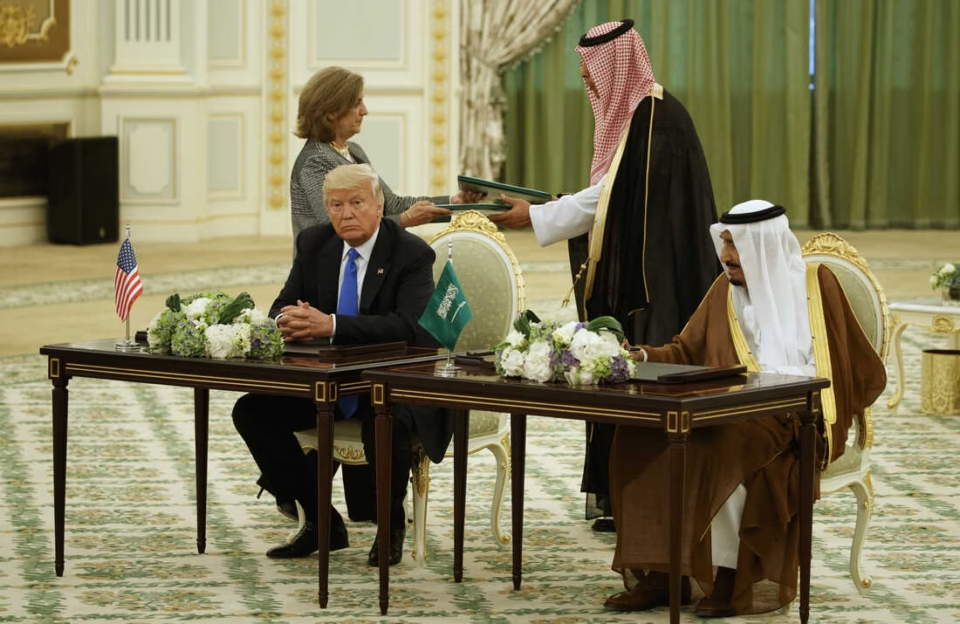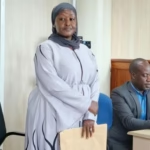US President Donald Trump and Saudi Crown Prince Mohammed bin Salman (MBS) signed a wide-ranging set of agreements during a high-profile visit to Riyadh, marking the beginning of Trump’s second-term foreign tour. The deals include:
Energy cooperation through a memorandum of understanding
A $100 billion letter of intent for future US arms sales to Saudi Arabia
Partnerships on mineral resources
A memorandum with the US Department of Justice
Joint efforts in space exploration and infectious disease research
These are memoranda of understanding (MoUs)—non-binding diplomatic tools outlining areas of intended cooperation.
Trump was met personally by Crown Prince Mohammed bin Salman at the steps of Air Force One, a stark contrast to President Biden’s 2022 visit, which saw a lower-level delegation.
The ceremonial welcome included a lavender carpet—replacing the traditional red, symbolizing Saudi heritage—and a motorcade flanked by horses carrying Saudi and US flags. Inside the Royal Court, the leaders joined a traditional coffee and tea ceremony in the ceremonial Blue Room, followed by a lavish state lunch.
The event also brought together an elite list of American CEOs and tech magnates:
Elon Musk (Tesla, SpaceX)
Sam Altman (OpenAI)
Jensen Huang (Nvidia)
Executives from Amazon, Google, Boeing, Coca-Cola, IBM, BlackRock, and Blackstone
Business leaders mingled with Saudi officials in a handshake-heavy reception line before sitting down to a meal showcasing Saudi cuisine. According to insiders, the deals being discussed could total over a trillion dollars in US-bound investments.
Saudi media gave extensive coverage to Trump’s visit, with outlets like Asharq al-Awsat highlighting the strategic shift in Saudi-US relations. Unlike the 2017 visit, the Kingdom now presents itself as an equal partner rather than a subordinate power.
The broader Middle East context is tense. With conflicts raging in Gaza and Lebanon, and continued instability in Syria and the Red Sea, Saudi Arabia has emerged as a regional mediator—something Trump acknowledged in private conversations, reportedly calling MBS a “friend” and praising their relationship.
While Trump’s itinerary has focused heavily on economic and strategic cooperation, Arab leaders are expected to press him to play a larger role in easing the humanitarian crisis in Gaza and pushing Israel toward a ceasefire.
Trump’s envoy to the region, Steve Witkoff, separately met with recently released US-Israeli hostage Edan Alexander in Israel. A phone call was arranged between the young soldier and Trump. Witkoff reaffirmed the administration’s commitment to securing the release of all remaining hostages.
Before the trip, Trump hinted at an “earth-shattering” announcement. Speculation ranged from a regional defence pact to a controversial renaming of the Persian Gulf to the Arabian Gulf—a move that would please Gulf allies but antagonize Iran.
At this stage, the true nature of this potential announcement remains unclear. What is evident, however, is the White House’s renewed focus on the Gulf as a strategic and economic anchor in its foreign policy.
Escorted into Riyadh by fighter jets aboard Air Force One
Attended ceremonial reception and tea service at Al Yamamah Palace
Held bilateral talks and signed MoUs with MBS
Hosted and dined with top US and Saudi business executives
Will attend a US-Saudi investment forum and a formal state dinner later in the day



